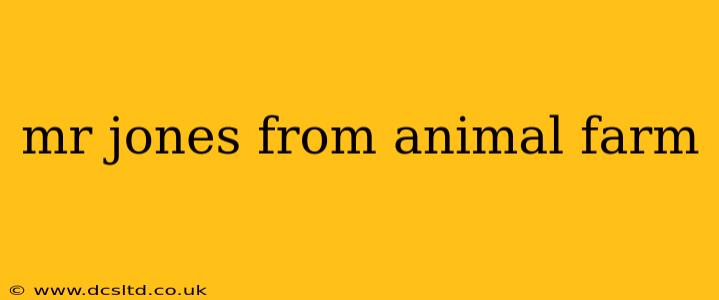George Orwell's Animal Farm is a satirical allegory of the Russian Revolution, and its characters serve as potent symbols. Mr. Jones, the farmer who initially owns Manor Farm, is perhaps the most crucial character in setting the stage for the animals' rebellion. He represents not only the flaws of the old Tsarist regime but also the inherent dangers of unchecked power and irresponsible leadership. This exploration delves into the significance of Mr. Jones, examining his role in the story and the symbolic weight he carries.
What Happens to Mr. Jones in Animal Farm?
Mr. Jones's downfall is swift and, to some extent, deserved. He's depicted as a neglectful and cruel farmer, frequently drunk and incapable of managing his farm effectively. His mismanagement leads to starvation and suffering among the animals. The animals' rebellion, sparked by their desperate conditions, culminates in Jones's expulsion from Manor Farm. He attempts a counter-revolution with the help of some neighboring farmers, but the animals, now organized and unified under the leadership of the pigs, decisively defeat him. After this defeat, Mr. Jones disappears from the narrative, his fate left ambiguous, suggesting his irrelevance in the new order established by the pigs.
Why is Mr. Jones Important to the Story?
Mr. Jones is crucial for several reasons:
-
Establishing the Need for Rebellion: His incompetence and cruelty provide the necessary impetus for the animals' uprising. He embodies the oppressive forces that the animals rise up against. Without his failings, there would be no revolution.
-
Foreshadowing the Pigs' Tyranny: Ironically, while Mr. Jones represents a flawed and oppressive system, the pigs, initially lauded as liberators, eventually evolve into an even more tyrannical regime. This parallel underscores the novel's warning against the dangers of unchecked power, regardless of ideology. The animals escape one form of oppression only to fall into another.
-
Symbol of the Tsarist Regime: Orwell clearly uses Mr. Jones as a symbolic representation of Tsar Nicholas II and the Russian aristocracy. Jones's incompetence mirrors the Tsar's inability to effectively govern Russia, leading to widespread discontent and revolution. His eviction from the farm represents the overthrow of the Tsar.
What are Mr. Jones's Main Characteristics?
Mr. Jones's characteristics are consistently negative, contributing to his symbolic function within the narrative:
- Ineptitude: He's a drunkard, lazy, and incapable of running the farm efficiently. His neglect directly leads to the suffering of the animals.
- Cruelty: While not outwardly sadistic, his negligence and lack of care for the animals' well-being border on cruelty. He allows them to starve and provides minimal care.
- Irresponsibility: He consistently fails in his duties as a farmer, demonstrating a lack of responsibility toward both his animals and his land.
What does Mr. Jones symbolize?
Mr. Jones is more than just a character; he's a multifaceted symbol:
- Oppression: He represents the oppressive nature of the old regime and the injustices suffered by the working class (in the allegorical context).
- Inefficient Leadership: His incompetence highlights the dangers of poor leadership and the consequences of failing to meet the needs of those under one's charge.
- The Old Order: He serves as a symbol of the outdated, failing system that is ultimately overthrown by the revolution.
How does Mr. Jones's disappearance affect the story?
Mr. Jones's disappearance from the narrative, while seemingly abrupt, is crucial. It signifies the complete triumph of the animals' revolution and the establishment of a new order, albeit one that ultimately proves just as oppressive as the previous one. His absence also leaves the reader to contemplate the irony of the revolution, highlighting how easily power can corrupt and how even supposedly benevolent leaders can become tyrannical.
Mr. Jones's character in Animal Farm isn't merely a simple villain; he's a complex symbol whose absence resonates deeply within the context of the novel's overarching themes of revolution, power, and the dangers of unchecked authority. His role is pivotal in setting the stage for the unfolding events and underscores the complexities of political upheaval and the cyclical nature of oppression.
